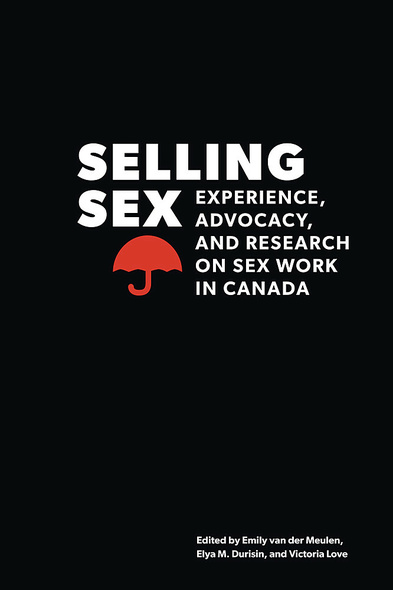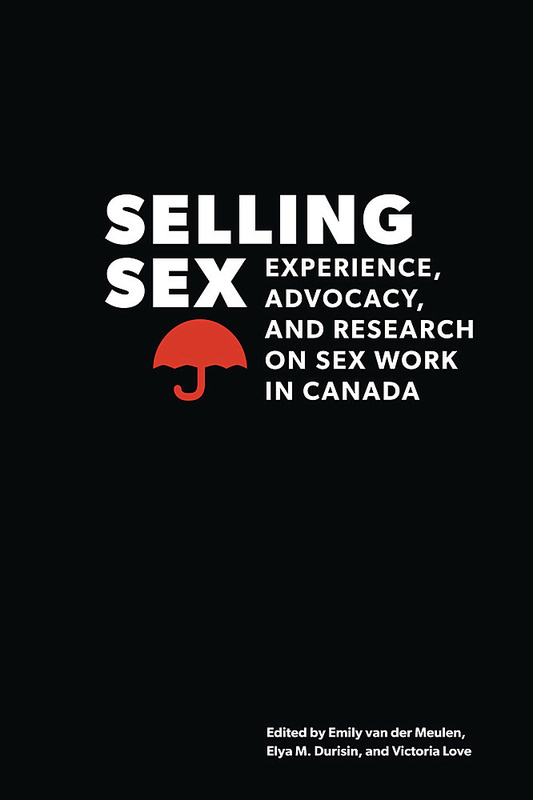
Selling Sex
Experience, Advocacy, and Research on Sex Work in Canada
Despite being dubbed “the world’s oldest profession,” prostitution has rarely been viewed as a legitimate form of labour. Instead, it has been criminalized, sensationalized, and polemicized across the socio-political spectrum by everyone from politicians to journalists to women’s groups. Interest in and concern over sex work is not grounded in the lived realities of those who work in the industry, but rather in inflammatory ideas about who is participating, how they wound up in this line of work, and what form it takes.
In Selling Sex, Emily van der Meulen, Elya M. Durisin, and Victoria Love present a more nuanced, balanced, and realistic view of the sex industry. They bring together a vast collection of voices – including researchers, feminists, academics, and advocates, as well as sex workers of differing ages, genders, and sectors – to engage in a dialogue that challenges the dominant narratives surrounding the sex industry and advances the idea that sex work is in fact work. Presenting a variety of opinions and perspectives on such diverse topics as the social stigma of sex work, police violence, labour organizing, anti-prostitution feminism, human trafficking, and harm reduction, Selling Sex is an eye-opening, challenging, and necessary book.
Selling Sex will appeal to scholars and students of sociology, women’s studies, and law, as well as sex workers, rights advocates, union and labour activists, and social workers.
A unique collection of sex workers and their allies describing and defending a timely subject. A very insightful read.
As a Canadian sex worker, I know too well how hard it can be to find a balanced, nuanced analysis of the lived experiences of people in my profession and the complex legal and social realities we encounter. Selling Sex proved to be a notable exception ... this book is invaluable as a resource to help people understand the complexities of the sex trade and to see the people who work within it as competent and capable of making their own decisions, rather than victims in need of rescue or deviants in need of punishment and control.
Selling Sex is an impressive testament to the agency, activism, and theorizing of sex workers, drawing from a multiplicity of viewpoints, including trans, male, youth, and Indigenous experiences. It importantly shines light on histories of sex work, the politics of regulation, and organizing for change in Canada and is a critical intervention into debates on feminism, anti-racism, and decolonization. A deeply insightful collection and a vital new contribution to the field of sex work studies.
Intellectually stimulating, emotionally engaging and beautifully written, Selling sex: Experience, advocacy and research on sex work in Canada weaves together the diverse voices and perspectives of sex workers, academics, and activists to present a multilayered, complex, and rich understanding of sex work practice, research, policy, and political organizing. This collection of chapters centers the lived experiences of sex workers who are experts in their own lives and who are critical to the knowledge production about sex work.I highly recommend this refreshing and inspiring book that positions itself as a form of activism and resistance against sensationalistic and mainstream narratives of sex work. It challenges unidimentional notions of sex work by highlighting often silenced communities, including male, trans, youth, and indigenous sex trade workers. This collection of voices is an essential read for anyone working in a practice setting with sex workers, for students engaging in a critical analysis of sex work, for researchers committed to privileging the lived experiences of marginalized communities, and for those interested advancing their human rights and engaging in activism for social change.
The breadth of ethnographic data and theoretical insights explored in Selling Sex makes it an excellent resource for most courses in sociology, law, gender and sexuality studies, criminology, and anthropology interested in deconstructing the contingent nature of sexuality, labor, and gender identity, and its intersection with various state agencies and other mechanisms of regulation. Similarly, the timely nature of this publication in relation to the Bedford decision situates this text, and the contributing authors, as influential authorities on sex work research in the post-Bedford era.
Selling Sex avoids the sensationalism favoured by other books on the subject and presents a wide range of perspectives to produce a timely and balanced account of an important issue.
Emily van der Meulen is an assistant professor in the Department of Criminal Justice and Criminology at Ryerson University. Elya M. Durisin is a doctoral candidate in the Department of Political Science at York University. Victoria Love is a sex worker, activist, and member of Maggie’s: The Toronto Sex Workers Action Project.
Contributors: Joyce Arthur, Cheryl Auger, Steven Bittle, Chris Bruckert, Jenn Clamen, Deborah Clipperton, Anna-Louise Crago, Susan Davis, Jane Doe, Tor Fletcher, Kara Gillies, Michael Goodyear, Stacey Hannem, Sarah Hunt, JJ, Leslie Ann Jeffrey, Tuulia Law, Annalee Lepp, Jacqueline Lewis, John Lowman, Gayle MacDonald, Karolyn Martin, Eleanor Maticka-Tyndale, River Redwood, Rene Ross, Trish Salah, Esther Shannon, Frances M. Shaver, Mariana Valverde, and Alan Young
Introduction / Emily van der Meulen, Elya M. Durisin, and Victoria Love
Part 1: Realities, Experiences, and Perspectives
1 Work, Sex, or Theatre? A Brief History of Toronto Strippers and Sex Work Identity / Deborah Clipperton
2 Myths and Realities of Male Sex Work: A Personal Perspective / River Redwood
3 Champagne, Strawberries, and Truck-Stop Motels: On Subjectivity and Sex Work / Victoria Love
4 Trans Sex Workers: Negotiating Sex, Gender, and Non-Normative Desire / Tor Fletcher
5 We Speak for Ourselves: Anti-Colonial and Self-Determined Responses to Young People Involved in the Sex Trade / JJ
6 Decolonizing Sex Work: Developing an Intersectional Indigenous Approach / Sarah Hunt
7 Transitioning Out of Sex Work: Exploring Sex Workers’ Experiences and Perspectives / Tuulia Law
Part 2: Organizing and Social Change
8 Working for Change: Sex Workers in the Union Struggle / Jenn Clamen, Kara Gillies, and Trish Salah
9 Overcoming Challenges: Vancouver’s Sex Worker Movement / Joyce Arthur, Susan Davis, and Esther Shannon
10 Né dans le Redlight: The Sex Workers’ Movement in Montreal / Anna-Louise Crago and Jenn Clamen
11 Stepping All Over the Stones: Negotiating Feminism and Harm Reduction in Halifax / Gayle MacDonald, Leslie Ann Jeffrey, Karolyn Martin, and Rene Ross
12 Are Feminists Leaving Women Behind? The Casting of Sexually Assaulted and Sex-Working Women / Jane Doe
13 Going ’round Again: The Persistence of Prostitution-Related Stigma / Jacqueline Lewis, Frances M. Shaver, and Eleanor Maticka-Tyndale
Part 3: The Politics of Regulation
14 Regulating Women’s Sexuality: Social Movements and Internal Exclusion / Michael Goodyear and Cheryl Auger
15 Crown Expert-Witness Testimony in Bedford v. Canada: Evidence-Based Argument or Victim-Paradigm Hyperbole? / John Lowman
16 Repeat Performance? Human Trafficking and the 2010 Vancouver Winter Olympic Games / Annalee Lepp
17 A Wolf in Sheep’s Clothing: Canadian Anti-Pimping Law and How It Harms Sex Workers / Kara Gillies
18 Still Punishing to “Protect”: Youth Prostitution Law and Policy Reform / Steven Bittle
19 To Serve and Protect? Structural Stigma, Social Profiling, and the Abuse of Police Power in Ottawa / Chris Bruckert and Stacey Hannem
20 Beyond the Criminal Code: Municipal Licensing and Zoning Bylaws / Emily van der Meulen and Mariana Valverde
Afterword / Alan Young
Index












